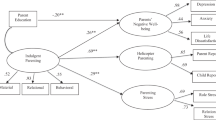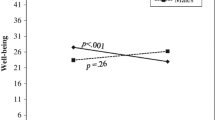Abstract
Helicopter Parenting (HP) refers to parenting behaviors such as overinvolvement and developmentally inappropriate support during late adolescence and emerging adulthood. To date, this construct has mainly been examined in Western cultures. This research developed and validated a multi-dimensional HP measure for mothers and late-adolescent children in Mainland China. Study 1 explored initial factor structure of HP with an online sample of Mainland Chinese mothers (N = 433; Mage = 43.63 years). Study 2 confirmed this structure with a new online sample of mothers (N = 461; Mage = 44.39 years), and assessed construct invariance between mothers of high school and college students. Study 3 confirmed this HP structure with mother-adolescent dyads (N = 248; Mothers: Mage = 44.29 years; Adolescents: Mage = 17.37 years) and assessed construct invariance and construct validity between dyad members. Across the three studies, results suggested a 16-item measure with four factors (advice/affect management, anticipatory problem solving, information-seeking, and emphasis on academic performance), which also loaded on a higher-order HP factor. The measure had good internal consistencies (αs ≥ 0.844). Fits for mother-reported high school and college student measurement invariance model, and mother-adolescent invariance model were acceptable when constraining all factor loadings. Mother and adolescent HP reports were modestly positively correlated. Within-respondent correlations in Studies 2 and 3 showed that the total HP scores were positively correlated with behavioral control and emotional support. However, mother-reported HP was negatively correlated with adolescent-reported emotional support, suggesting discrepant views about which parenting behaviors are helpful vs. overbearing. Mother- and adolescent-reported HP scores were not related to adolescent-reported psychological control or self-efficacy. This study offers a concise, multidimensional Chinese HP measure which is useful to examine Chinese mother-adolescent reporter discrepancies, as well as associations between Chinese HP and youth’s psychological functioning.
Highlights
-
This research developed a 16-item measure of HP, with four factors, that was invariant between mothers’ and adolescents’ reports in Mainland China.
-
Results suggested that Chinese mothers and their adolescent children differed in views of the extent to which parenting behaviors were supportive vs. overbearing.
-
In contrast to Western studies, HP was not associated with youth perceptions of psychological control or self-efficacy.

Similar content being viewed by others
References
Arnett, J. J. (2007). Emerging adulthood: What is it, and what is it good for? Child Development Perspectives, 1(2), 68–73.
Barber, B. K. (1996). Parental psychological control: Revisiting a neglected construct. Child Development, 67(6), 3296–3319.
Baumrind, D. (1971). Current patterns of parental authority. Developmental Psychology, 4(1p2), 1.
Bornstein, M. H., & Cheah, C. S. L. (2006). The Place of “Culture and Parenting” in the Ecological Contextual Perspective on Developmental Science. In K. H. Rubin & O. B. Chung (Eds.), Parenting beliefs, behaviors, and parent-child relations: a cross-cultural perspective (p. 3–33). New York: Psychology Press.
Buchanan, T., & LeMoyne, T. (2020). Helicopter parenting and the moderating impact of gender and single-parent family structure on self-efficacy and well-being. The Family Journal, 28(3), 262–272.
Buri, J. R. (1991). Parental authority questionnaire. Journal of Personality Assessment, 57(1), 110–119.
Bradley-Geist, J. C., & Olson-Buchanan, J. B. (2014). Helicopter parents: an examination of the correlates of over-parenting of college students. Education+Training, 56(4), 314–328.
Cameron, L., Erkal, N., Gangadharan, L., & Meng, X. (2013). Little emperors: Behavioral impacts of China’s One-Child Policy. Science, 339(6122), 953–957.
Chao, R., & Tseng, V. (2002). Parenting of Asians. Handbook of Parenting, 4, 59–93.
Chen, F. F. (2007). Sensitivity of goodness of fit indexes to lack of measurement invariance. Structural Equation Modeling: A Multidisciplinary Journal, 14(3), 464–504.
Costello, A. B., & Osborne, J. W. (2005). Best practices in exploratory factor analysis: four recommendations for getting the most from your analysis. Practical Assessment, Research and Evaluation, 2005, 10.
Cui, M., Allen, J. W., Fincham, F. D., May, R. W., & Love, H. (2019). Helicopter parenting, self-regulatory processes, and alcohol use among female college students. Journal of Adult Development, 26(2), 97–104.
Deutsch, F. M. (2006). Filial piety, patrilineality, and China’s one-child policy. Journal of Family Issues, 27(3), 366–389.
Fuligni, A. J. (1998). Authority, Autonomy, and Parent-Adolescent Conflict and Cohesion. Developmental Psychology, 34(4), 782–792.
Furman, W., & Buhrmester, D. (1985). Children’s perceptions of the personal relationships in their social networks. Developmental Psychology, 21(6), 1016.
Givertz, M., & Segrin, C. (2014). The association between overinvolved parenting and young adults’ self-efficacy, psychological entitlement, and family communication. Communication Research, 41(8), 1111–1136.
Grusec, J. E., Rudy, D., & Martini, T. (1997). Parenting cognitions and child outcomes: An overview and implications for children’s internalization of values. In J. E. Grusec & L. Kuczynski (Eds.), Parenting and children’s internalization of values: A handbook of contemporary theory (p. 259–282). New York: John Wiley & Sons Inc.
Hamamura, T., Heine, S. J., & Paulhus, D. L. (2008). Cultural differences in response styles: the role of dialectical thinking. Personality and Individual Differences, 44(4), 932–942.
Hawk, S. T. (2017). Chinese adolescents’ reports of covert parental monitoring: comparisons with overt monitoring and links with information management. Journal of adolescence, 55, 24–35.
Hong, J. C., Hwang, M. Y., Kuo, Y. C., & Hsu, W. Y. (2015). Parental monitoring and helicopter parenting relevant to vocational student’s procrastination and self-regulated learning. Learning and Individual Differences, 42, 139–146.
Ho, E. S. C., & Willms, J. D. (1996). The effects of parental involvement on eighth grade achievement. Sociology of Education, 69, 126–141.
Kline, R. B. (2011). Principles and practice of structural equation modeling (4th Editions). New York: Guilford publications.
Lam, S. F., Lau, I. Y., Chiu, C. Y., Hong, Y. Y., & Peng, S. Q. (1999). Differential emphases on modernity and Confucian values in social categorization: The case of Hong Kong adolescents in political transition. International Journal of Intercultural Relations, 23(2), 237–256.
Leung, J. T., & Shek, D. T. (2018). Validation of the perceived Chinese overparenting scale in emerging adults in Hong Kong. Journal of Child and Family Studies, 27(1), 103–117.
Luebbe, A. M., Mancini, K. J., Kiel, E. J., Spangler, B. R., Semlak, J. L., & Fussner, L. M. (2018). Dimensionality of helicopter parenting and relations to emotional, decision-making, and academic functioning in emerging adults. Assessment, 25(7), 841–857.
Muthén, L. K., & Muthén, B. O. (2006). Mplus: Statistical Analysis with Latent Variables; User’s Guide; [Version 4.1]. Los Angeles, CA: Muthén and Muthén.
National Bureau of Statistics (2010). Reproductive status of women of childbearing age in China by age and number of children, http://www.stats.gov.cn/tjsj/pcsj/rkpc/6rp/html/B0603a.htm.
Odenweller, K. G., Booth-Butterfield, M., & Weber, K. (2014). Investigating helicopter parenting, family environments, and relational outcomes for millennials. Communication Studies, 65(4), 407–425.
Oldehinkel, A. J., Veenstra, R., Ormel, J., De Winter, A. F., & Verhulst, F. C. (2006). Temperament, parenting, and depressive symptoms in a population sample of preadolescents. Journal of Child Psychology and Psychiatry, 47(7), 684–695.
Padilla-Walker, L. M., & Nelson, L. J. (2012). Black hawk down?: Establishing helicopter parenting as a distinct construct from other forms of parental control during emerging adulthood. Journal of Adolescence, 35(5), 1177–1190.
Pomerantz, E. M., & Wang, Q. (2009). The role of parental control in children’s development in Western and East Asian countries. Current Directions in Psychological Science, 18(5), 285–289.
Qin, L., Pomerantz, E. M., & Wang, Q. (2009). Are gains in decision‐making autonomy during early adolescence beneficial for emotional functioning? The case of the United States and China. Child Development, 80(6), 1705–1721.
Schiffrin, H. H., Liss, M., Miles-McLean, H., Geary, K. A., Erchull, M. J., & Tashner, T. (2014). Helping or hovering? The effects of helicopter parenting on college students’ well-being. Journal of Child and Family Studies, 23(3), 548–557.
Schiffrin, H. H., & Liss, M. (2017). The effects of helicopter parenting on academic motivation. Journal of Child and Family Studies, 26(5), 1472–1480.
Segrin, C., Givertz, M., Swaitkowski, P., & Montgomery, N. (2015). Overparenting is associated with child problems and a critical family environment. Journal of Child and Family Studies, 24(2), 470–479.
Segrin, C., Woszidlo, A., Givertz, M., Bauer, A., & Taylor Murphy, M. (2012). The association between overparenting, parent‐child communication, and entitlement and adaptive traits in adult children. Family Relations, 61(2), 237–252.
Segrin, C., Woszidlo, A., Givertz, M., & Montgomery, N. (2013). Parent and child traits associated with overparenting. Journal of Social and Clinical Psychology, 32(6), 569–595.
Sherer, M., Maddux, J. E., Mercandante, B., Prentice-Dunn, S., Jacobs, B., & Rogers, R. W. (1982). The self-efficacy scale: construction and validation. Psychological Reports, 51(2), 663–671.
Zigmond, A. S., & Snaith, R. P. (1983). The hospital anxiety and depression scale. Acta Psychiatrica Scandinavica, 67(6), 361–370.
Author information
Authors and Affiliations
Corresponding author
Ethics declarations
Conflict of interest
The authors declare no competing interests.
Additional information
Publisher’s note Springer Nature remains neutral with regard to jurisdictional claims in published maps and institutional affiliations.
Appendix I Chinese Version of Helicopter Parenting Measure (Parent survey)
Appendix I Chinese Version of Helicopter Parenting Measure (Parent survey)
1. 我给我的孩子做事情的建议。
2. 为了帮我的孩子完成任务, 我通常给他/她一些建议。
3. 我会告诉我的孩子如何计划某些活动。
4. 我对孩子说一些话或者做一些事让他/她高兴起来。
5. 我和孩子交流如何处理他/她遇到的各种情况。
6. 我努力在我的孩子遇到问题之前为他/她解决问题。
7. 如果我能看到我的孩子将要遇到某种困难, 我会介入并在他/她遇到困难之前处理。
8. 我努力帮我的孩子避免他/她在世界上可能遇到的任何麻烦。
9. 我试图预测妨碍我的孩子实现目标的事, 并在它变成问题之前解决。
10. 我想知道孩子社交生活的一些细节。
11. 我想知道孩子每日安排的细节。
12. 我想了解我的孩子每天的最新情况。
13. 我想了解我孩子的行踪的最新情况。
14. 我经常向老师咨询我孩子的学业进展。
15. 我尽一切努力提高孩子的学业成绩。
16. 我非常关注孩子的考试。
*17. 我会注意确保我的孩子的财务需求得到了满足。
*18. 我不希望我的孩子担心财务状况以及他/她的花销是多少。
*19. 我很乐意为我的孩子做家务, 比如做饭, 打扫和洗衣服。
Advice/affect management: 1-5
Anticipatory problem solving: 6-9
Information seeking: 10-13
Emphasis on academic performance:14-16
*Tangible assistance: 17-19
(*This subscale could be used when participants only include mothers)
Rights and permissions
About this article
Cite this article
Zong, W., Hawk, S.T. Evaluating the Structure and Correlates of Helicopter Parenting in Mainland China. J Child Fam Stud 31, 2436–2453 (2022). https://doi.org/10.1007/s10826-022-02370-6
Accepted:
Published:
Issue Date:
DOI: https://doi.org/10.1007/s10826-022-02370-6




